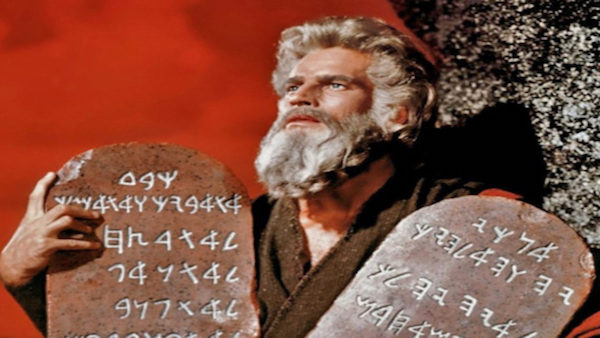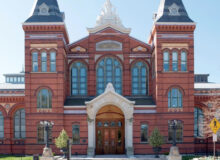Beginning with the sunset on Thursday, May 27, Jews throughout the world will start to observe Shavuot, a meaningful and my personal favorite of all the Jewish holidays (more on this later). Shavuot commemorates that incredible day when God gave the newly freed Hebrew slaves what is popularly known as the Ten Commandments and the Torah.
People living in the US (including many Jews) might think that Chanukah is the major Jewish holiday. Actually, it is a very minor holiday. Shavuot is one of the three major festivals (the other two are Passover and Sukkot). In biblical days, Jews would travel from all over the Holy Land to Jerusalem to make a sacrifice at the Holy Temple on those three festivals.
Historically, Shavuot celebrates the giving of the Torah at Mount Sinai and is also known as Hag Matan Torateinu (the Festival of the Giving of Our Torah). Notice it says giving of the Torah not receiving of the Torah. We believe that Jews are always receiving the Torah, learning its meanings, understanding the mitzvot. Therefore using receiving doesn’t really work because every day is the time of receiving the Torah.
Interesting Facts about Shavuot:
- Mount Sinai: We are taught that Mount Sinai was chosen because it was a “modest-sized mountain” One might think it was because Moses was an alter kaker (Yiddish for cranky old man-literally an old sh*tter) when he had to climb the mountain. He had to climb up and down 4 times, and he was 80 years old. God chose a moderately- mountain because he wanted to show that man did not have to be large in stature to meet his potential. Another reason Sinai was chosen was that it was outside of the Holy Land. The laws given at Sinai are fundamental and should apply to all people. Since the commandments were given outside of the Holy Land, God could legitimately demand that these basic rules about how people should live their lives apply not just to Jews but to all people.
- What Moses looked like: How the heck would I know. But I can definitely tell you he didn’t look like Charlton Heston or the traditional ways the lawgiver has been portrayed in movies and art. Think about it, here was the child of Hebrew slaves raised in the court of Pharaoh–why would he look like a tall westerner? Sorry to burst your bubbles, but Moses was probably short by today’s standards and had dark skin like Middle Easterners today (and BTW we know his wife was black).
- The Revelation at Sinai. Think about this for a second, the Torah says there were 603,000 people at Sinai, to hear God’s words in God’s voice. The first two of the Ten Commandments were also heard directly from God speaking to the Jewish people, and not through Moses as an intermediary. Jewish tradition explains that the experience was so powerful that the newly freed slaves “died” from the impact of hearing God’s voice (I guess he didn’t sound like George Burns in “Oh God.”. Their souls actually left their bodies from the force of the interaction, and God had to “revive” them. After this happened twice, the Jewish people said, “Enough! We’re convinced – you tell Moses, and he can tell us the rest of them to us!” I bet God was also relieved. It can’t be easy to revive 603K people. A crucial part of the revelation at Sinai that most people don’t realize is that there is no other religious event in the history of mankind where the presence of God was seen and heard by an entire nation. Some you may be thinking, “It is all a fable and never really happened.” I bet those folks also believe that the moon landing was staged. Unlike the moon landing, there is no way to prove the story of the revelation at Sinai really happened (that’s why it’s called faith). But ponder this: There were 603K witnesses. Not one of those witnesses wrote a minority opinion. There are no accounts from that time saying the entire lawgiving thing was done on a sound stage in Brooklyn, or that it wasn’t God from on high–it was Moses standing on some wooden boxes speaking through a bull horn and reading the commandments off of an iPad.
- In the Torah, the first word of the Ten Commandments Anochi (I am) is not in Hebrew. It’s in Egyptian. There are 50 days between when the Jews left Egypt (Passover) and when they got the law at Sinai (Shavuot). That’s not a lot of time, especially when one considers the nascent Jews were slaves for a few hundred years. Heck, they weren’t even away from Egypt long enough to forget the phone numbers of the best Egyptian take-out joints. The Lord wanted them to feel comfortable, so he started with an Egyptian word, bringing up the question–if the revelation at Sinai happened today, would the first words be ‘Dudes, check it out, I’m the Alpha Dog here.”
- They’re not really called the Ten Commandments, at least in Judaism. In Biblical Hebrew, the commandments are called עשרת הדברים (transliterated Aseret ha-Dvarîm). In Rabbinical Hebrew it’s עשרת הדברות (transliterated Aseret ha-Dibrot). Each of the Hebrew names translates as “the ten words” or “the ten things. Many Rabbis believe that the rest of the commandments in the Torah stems from these 10. They also teach that these 10 are not more important than the other all 603 commandments in the Torah. Well, except for giving charity and honoring one’s parents. Pirkei Avot, a book of the Mishnah, teaches, “Be as meticulous in performing a ‘minor’ mitzvah as you are with a ‘major’ one because you don’t know what kind of reward you’ll get for various mitzvot.”
- The Commandments have no “Thou Shalts.” Our maker is a “bottom line” type of guy, and fitting all of those Hebrew words on stone tablets small enough for an 80-year-old alter kaker to carry down a mountain is not easy. So there were no “thou shalts,” nor were there any “thou shalt nots,” in the commandments. Those are all fancy words added by humans who thought God needed embellishments to be cool. Either that or when it translated from the Hebrew, the translators were paid by the word. Folks, we are talking about the word of God—the freaking creator of the universe. The omnipotent being who boldly went where no man has gone before (or again), countless billions of years before James Tiberius Kirk appeared on TV screens. There is no being in history more supreme. God’s words needed no embellishments, therefore as an example, it’s not “Thou shalt not steal” as it reads in many English translations—it’s a simple “Don’t Steal.”
- No commandment says, “Don’t Kill.” In the original Hebrew the commandment, לֹא תִרְצָח translates as “Don’t murder.” What’s the difference? If it said “don’t kill” then acts of self-defense, the death penalty, war, etc. would be banned—they’re not, only murders. The kind you would watch on Discovery ID.
- Moses’ Father-in-Law Gets Top Billing? The name of the Parsha (weekly Torah reading) in which the revelation at Sinai occurs is not named after the Ten Commandments. It is called Yitro, named after Moses’ father-in-law, who was a Gentile. There are only two Parshot in the Torah named after a non-Jew, so this is a big deal. At the beginning of this Parsha, Yitro sits Moses down and explains to him that he needs to delegate responsibility so he can spend more time with his family. From this, we learn that to God, Shalom Ha-Bayit (peace in the home) is more important than anything, even the revelation at Sinai. It’s a message that spending time with family is also God’s work. We also learn that fathers-in-law are not only allowed to but are supposed to butt in.
- All Night Study Sessions: The first night of Shavuot, the tradition is to spend the evening studying. That’s because the Rabbis tell us that the children of Israel overslept at Sinai. They base that claim on what it says in Exodus 19:16: “It came to pass on the third day when it was morning, that there were thunderclaps and lightning flashes, and a thick cloud was upon the mountain, and a very powerful blast of a shofar, and the entire nation that was in the camp shuddered.”
The Rabbis interpret this verse as God was already on the top of Sinai waiting for the Hebrews to wake up, but the newly freed slaves forgot to set their alarms and overslept. The Lord had to make a heck of a racket to get them to wake up. That’s why on the first evening of the holiday (Thursday night this year), synagogues across the world have what’s called Tikkun Leil Shavuot (repairing the Evening of Shavuot). Jew spend all night studying Torah make up for the fact that they screwed up and overslept at Sinai. The purpose is to show God that we appreciate the Torah he gave us, and there will be no grabbing an extra few winks this time. And to help them to stay awake–Jews eat while studying all night.
- Pizza, Blintzes, and Ice Cream, This is the reason why Shavuot is my Favorite Jewish Holiday. As part of the new Torah given at Sinai, the Israelites learned about keeping Kosher. That’s when they realized their plates were not “Kosher.” While they were making their plates and utensils Kosher, they ate only dairy. So to remember that day of getting the Torah, Jews only eat dairy also. Because of that, Shavuot can be 48 hours of pizza, blintzes, and Oreo cookie ice cream (to be truthful any flavor is okay, Oreo cookie is my personal favorite). That’s why Shavuot is my favorite Jewish holiday. The two days of Shavuot, are the only two days of the year I can tell my wife “Yes honey, I am a diabetic, and the doctor did tell me to lose weight, but this is not splurging, I am only eating this pint of ice cream because I am following God’s Law” Now let me ask you, how cool is that?
There is an old story about a religious school Gan (kindergarten) teacher talking to her students about the holiday of Shavuot.
“OK Class, who knows why we celebrate Shavuot?”
“Oooh, Oooh, I know,” said little Karen, “Shavuot is when we light candles and celebrate the Maccabees.”
“No Karen, that’s Chanukah good try,” said the teacher. “Anybody else?”
Shmuley raised his hand. “Shavuot is when we wear costumes and play with noisemakers”
“Sorry Shmuley, that is Purim.” the teacher said. Just then a little boy in the back of the room who had never raised his hand all year long tentatively raised his hand. “Yes Johnny?” said the teacher hopefully.
“I know Shavout,” Johnny said softly,” You see, Moses went up the mountain and stayed for 40 days and 40 nights.”
“That’s right Johnny,” the teacher encouraged.
Johnny continued and with each word out of his mouth he seemed to gain confidence, “After 40 days Moses came down the mountain carrying two stone tablets that had the Ten Commandments on them.
“Keep going” said the teacher.
Johnny says, “And if he sees his shadow we have six more weeks of winter.”
Folks have a wonderful holiday. Whether you are Jew or Gentile, remember to make sure and eat lots of your favorite flavor of ice cream (its God’s will).
Oh, and as for those ten words (commandments) that were written on the two tablets that Moses, an 80-year-old alter kaker brought down from Mount Sinai, I have cross-posted them in English, below:
Exodus 20:2 (H/T God):
Then God said all these words: “I am the Lord your God, who brought you out of the land of Egypt, out of slavery.
1)You are to have no other gods before me.
2)You are not to make for yourselves a carved image or any kind of representation of anything in heaven above, on the earth beneath or in the water below the shoreline. You are not to bow down to them or serve them; for I, the Lord your God, am a jealous God, punishing the children for the sins of the parents to the third and fourth generation of those who hate me, but displaying grace to the thousandth generation of those who love me and obey my mitzvot.
3) You are not to use the name of the Lord your God lightly, because the Lord will not leave unpunished someone who uses his name lightly.
4) Remember the day, Shabbat, to set it apart for God. You have six days to labor and do all your work, but the seventh day is a Shabbat for the Lord your God. On it, you are not to do any kind of work -not you, your son or your daughter, not your male or female slave, not your livestock, and not the foreigner staying with you inside the gates to your property. For in six days, the Lord made heaven and earth, the sea and everything in them; but on the seventh day, he rested. This is why the Lord blessed the day, Shabbat, and separated it for himself. [Think about that, the first time in history a designated day off….and it wasn’t a union demand,]
5) Honor your father and mother so that you may live long in the land which the Lord your God is giving you. [That land is now called Israel]
6) Don’t murder.
7) Don’t commit adultery.
8) Don’t steal.
9) Don’t give false evidence against your neighbor [Note: this is Al Sharpton’s least favorite of the ten.]
10) Do not covet your neighbor’s house; do not covet your neighbor’s wife, his male or female slave, his ox, his donkey, or anything that belongs to your neighbor.“
https://lidblog1.wpenginepowered.com
Shavuot ten commandments, Shavuot ten commandments, Shavuot ten commandments, Shavuot ten commandments, Shavuot ten commandments, Shavuot ten commandments, Shavuot ten commandments, Shavuot ten commandments.






